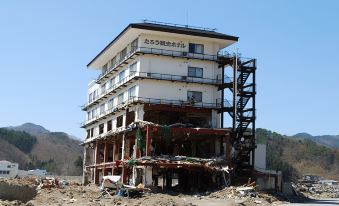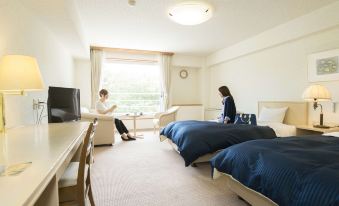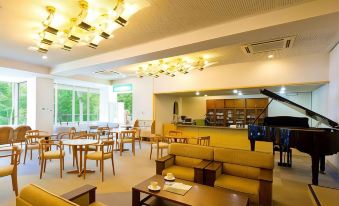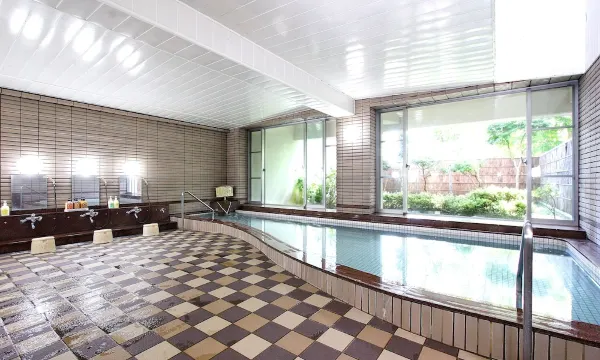Kyukamura Rikuchu-Miyako
1 night
March 2025
- Mon
- Tue
- Wed
- Thu
- Fri
- Sat
- Sun
- 1
- 2
- 3
- 4
- 5
- 6
- 7
- 8
- 9
- 10
- 11
- 12
- 13
- 14
- 15
- 16
- 17
- 18
- 19
- 20
- 21
- 22
- 23
- 24
- 25
- 26
- 27
- 28
- 29
- 30
- 31
April 2025
- Mon
- Tue
- Wed
- Thu
- Fri
- Sat
- Sun
- 1
- 2
- 3
- 4
- 5
- 6
- 7
- 8
- 9
- 10
- 11
- 12
- 13
- 14
- 15
- 16
- 17
- 18
- 19
- 20
- 21
- 22
- 23
- 24
- 25
- 26
- 27
- 28
- 29
- 30
Rooms and Guests
1 room, 2 adults, 0 children
All Properties in Miyako
Kyukamura Rikuchu-Miyako
Dai 18 Chiwari-25-3 Sakikuwagasaki, Miyako City, Iwate Prefecture 027-0096, Japan
Show on Map
Located in Miyako, Kyukamura Rikuchu-Miyako provides air-conditioned rooms with free WiFi. This 4-star hotel offers luggage storage space. There's a restaurant serving Chinese cuisine, and free private parking is available.
Guest rooms in the hotel are equipped with a TV.
Iwate Prefectural Fishery Science Museum is 5.4 miles from Kyukamura Rikuchu-Miyako, while Ryusendo Cave is 26 miles away. Iwate Hanamaki Airport is 73 miles from the property.Show More
We Price Match







 Highlights
Highlights Free parking
Free parking Delicious breakfast
Delicious breakfast Lots to do
Lots to doAmenities
ParkingFree
Hiking
Spa
Luggage storage
Tennis court
Restaurant
All Amenities
Property Description
Located in Miyako, Kyukamura Rikuchu-Miyako provides air-conditioned rooms with free WiFi. This 4-star hotel offers luggage storage space. There's a restaurant serving Chinese cuisine, and free private parking is available.
Guest rooms in the hotel are equipped with a TV.
Iwate Prefectural Fishery Science Museum is 5.4 miles from Kyukamura Rikuchu-Miyako, while Ryusendo Cave is 26 miles away. Iwate Hanamaki Airport is 73 miles from the property.
Show More
3.6/5
Cleanliness3.6
Amenities3.6
Location3.6
Service3.6
All 3 Reviews
Surroundings
Train: JR Miyako station
(9.9 km)
Train: JR Sokei station
(10.4 km)
Landmarks: Anegasaki Observatory
(200m)
Landmarks: Miyako Anegasaki San Sportsland
(350m)
Landmarks: Blowhole
(810m)
View on Map
Rooms
Guest Reviews
Services & Amenities
Policies

2
Twin Room with Bath
Has window
Non-smoking
Private bathroom
Check Availability

2
Japanese-Style Room
Has window
Non-smoking
Check Availability

2
Twin Room With Bath
Has window
Non-smoking
TV
Telephone
Private entrance
Heating
Check Availability

1
Japanese Style 10-Tatami Mat + Non Smoking
Has window
Non-smoking
Check Availability

2
Japanese Style 8-Tatami Mat + Non Smoking
Has window
Non-smoking
Check Availability
Hide Room Types
Guest Reviews
3.6/5
3 reviews
 Verified Reviews
Verified Reviews- Cleanliness3.6
- Amenities3.6
- Location3.6
- Service3.6
Average for similar properties in Miyako
Book now and leave a review after your stay to earn up to 120 Trip Coins (approx. ₹ 104.25). Trip Coins can be used to save instantly on room rates.

AI Summary
The breakfast buffet with local ingredients and ice cream was popular. Guests appreciated the warm smiles and thoughtful service from the staff. The welcome drink in the lounge was also well-received.

Guest User
October 24, 2024

No bathroom in the rooms. Everything is very dated and old. We paid $250 for one night, very expensive for what it is even with dinner and breakfast There were hair on the bedsheets. No facilities Very unpleasant experience. The dinner was nice.

Guest User
April 17, 2022

Good points: 1. Meals include a lot of local seafood. Local Aiman features a lineup of cucumbers (I like that they don't label them as mussels), red plates, shellfish, whelks, and sea squirts that even locals don't often eat. Kamameshi made with your favorite ingredients is also interesting. We are making a big effort to include bottle-don, which is currently on sale locally and is packed with seafood ingredients, and is available for breakfast at no additional charge. It is packed with delicious side dishes that go well with your meal, such as sticky seaweed Akamoku, ta rako, and hot spring*. I was disappointed that there was no shrimp in the grilled seafood, but the squid had a chewy texture that made it taste good. Desserts included local yogurt as well as parfait-like items made to your liking, which were delicious, easy, and overall satisfying. I think it's good that the ingredients used in Sanriku, such as sashimi and saury fishball soup, have a sense of distinction that can only be found here. To put it simply, I can feel their enthusiasm, as if to say, ``Don't mess with the food at public inns.'' Bravo no, Bono. ②Unfortunately, the bath is not a hot spring, there is no open-air bath, and there is no view. However, there is a small garden outside the indoor bath with cherry blossoms, azaleas, hydrangeas, dandelions (weeds?), etc., which are planted at different times of the year. The scenery you can enjoy while enjoying the view feels calm and modest. There are facial cleansers made from alcohol and facial cleansers that remove grime like erasers, which are fun. If you can remove dirt from your face, I think it would be a good idea to rub it on your feet if you have smelly feet. ③Although the room has deteriorated over time, it feels like it has been well maintained. Amenities other than toothbrushes must be declared and received at the front desk. I agree with the policy of not using unnecessary items as it is environmentally friendly. It might be important not to take something home just because it's free. The paintings displayed in the room have Jodogahama as their theme and I like them. There are some inns that are decorated with meaningless landscape paintings and abstract paintings, but to ordinary people who don't have a sense of art, they just look at them as ``?''. The sweets in the room are also famous Miyako sweets and I like them. Some inns employ semi-local staff, but I think it's the right choice to stick to the local area. Oh yeah, it was nice to have a bath towel rack. Most of the hotels are places I'd like to stay in, but this might be the first time I've actually been to one. ④The front desk staff will promptly respond with a smile, calm and polite explanations even if you arrive a little early at check-in. The same goes for checkout. I felt that the way he slowly folded the receipt in thirds was calm and graceful. Disappointing points: 1) The grilled salmon I was looking forward to, tasted more like steamed than grilled. I wish they would have grilled it, not just charcoal, but gas, too. I also wanted the salt-grilled shrimp. A group of four middle-aged women, perhaps feeling the exhilaration of traveling or simply eating in silence. ``I'm happy to eat this,'' said the grandmother, talking in full swing. Even if you spilled ice cream on it, there was about one old woman who pretended not to know and disappeared. ②Bath. Two middle-aged people. No towels, no hesitation in conversation. She even points out the silent bathing, but she apologizes and says, ``Sorry,'' but soon things are back to normal. If you don't wipe your body, it will be a nuisance to everyone. ③Restaurant staff. Where can I find guidance on silent eating? Far from turning a blind eye, he completely ignored it. Corona is not a bad thing either. Is it okay for me to stay the night? Overall: The food is local and very good. I was able to use it at a reasonable price thanks to the prefectural discount, but I think the regular price of 12,000 yen is quite aggressive. I think that silent bathing and eating are the prerequisites for ``travel'', but a group of travelers who appear to be retired or older seem to have put away the shame of traveling. Did these people not have parents or adults or companions or companions who taught them morals and manners? Although he is not lacking in age, he feels very unsightly and bitter. The restaurant staff seemed to want to avoid unnecessary trouble, and there was no warning or guidance. Is it possible that there is a win-win relationship between an inn that doesn't follow good manners and a guest that doesn't follow good manners? Good customers are expelled from bad hotels, and only bad customers remain in bad hotels. "Customer is God" is not. (I don't know if I'm a good customer) Proper hot spring etiquette (sprinkling hot springs, wiping your body before entering, etc.) Education and dissemination. ``Enforcing silent bathing and silent eating'' as a coronavirus countermeasure is directly connected to ``protecting guests'' and ``protecting inn staff.'' ``Is the coronavirus going to get worse?'' I would like to see a firm response. Why can't I just say "shut up and eat" instead of "shut up and eat"?
Original TextTranslation provided by Google

Guest User
April 9, 2022

秋田からの連泊で宮古に。あてもないので休暇村を選択。施設は老朽化気味、月曜日ということもあり閑散としていたが、食事はビュッフェということで期待。色々な鍋を試せるのが良かったが、寿司はパンフレットでは豪華に並んでいたが実際は小皿に3貫だけとややさみしい感じ。部屋もベッドとテレビの間にソファがあり広さは十分だったが壁が薄く隣の部屋の音が結構気になった。夏は海が近いので家族づれには楽しいかもしれないが、冬のカップルには少しものたりないかもしれない。2食付きということもあり宿泊費もやや高め。
Translate
Services & Amenities
Most Popular Amenities
Parking
Free
Hiking
Spa
Luggage storage
Tennis court
Restaurant
Wi-Fi in public areas

Spa

Restaurant
Restaurant
More Amenities
Internet
Wi-Fi in public areas
Parking
Parking
Free
Front Desk Services
Luggage storage
VIP check-in service
Languages Spoken
Japanese
Health & Wellness
Tennis court
Spa
Hiking
Public baths
Additional charge
Activities
Eco tours
Public Areas
Elevator
No smoking in public areas
Smoking area
Vending machines
Cleaning Services
Laundry service (on-site)
Additional charge
Facilities for Children
Children's meals available
Children's slippers
Business Services
Fax/copying service
Additional charge
Safety & Security
CCTV in public areas
First aid kit
Fire extinguisher
Smoke detector
Intruder alarm
Security personnel
Property Policies
Check-in and Check-out Times
Check-in: 15:00–19:00
Check-out: Before 10:00
Child Policies
Children of all ages are welcome at this property.
Additional fees may be charged for children using existing beds. Add the number of children to get a more accurate price.
Cots and Extra Beds
Extra bed and crib policies may vary according to room type. Please refer to the room type details for more information.
Breakfast
TypeAsian
| Age | Fee |
|---|---|
Adult | Contact hotel |
Additional breakfast fees are not included in the total and need to be paid at the property.
Pets
Pets are not allowed
Age Requirements
The main guest checking in must be at least 18 years old.
Paying at the Hotel





- Cash
Property Description
- Number of Rooms: 67
Located in Miyako, Kyukamura Rikuchu-Miyako provides air-conditioned rooms with free WiFi. This 4-star hotel offers luggage storage space. There's a restaurant serving Chinese cuisine, and free private parking is available.
Guest rooms in the hotel are equipped with a TV.
Iwate Prefectural Fishery Science Museum is 5.4 miles from Kyukamura Rikuchu-Miyako, while Ryusendo Cave is 26 miles away. Iwate Hanamaki Airport is 73 miles from the property.